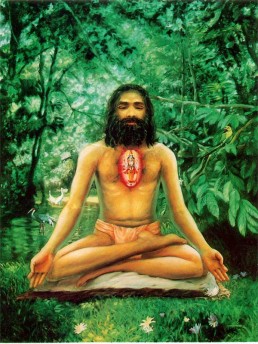Commentary
Mind and intellect of an individual function through the body in the world outside as per the qualities they assume because of the actions performed in their earlier births. The wrong and negative qualities of the mind and intellect are sins in the language of Vedanta. After purifying the mind from these sins the aspirant practices meditation and ultimately the mind becomes devoid of impressions which is called the end of the mind since the mind is nothing but a flow of thoughts.
When there is no thought, there is no mind and where there is no mind there is no ego which is termed as `reaching the highest goal’ or Self-Rediscovery. Little by little acquiring, through many births, the knowledge of Reality, he ultimately attains perfection. The Gita gives us hopeful belief in the redemption of all.
Although this theory is explained here in one or two sentences, in actual implementation, it is an achievement of many life times – `many births’ as The Lord puts it.
THE PERFECT YOGI
Swami Chinmayananda
Swami Chinmayananda Commentary
The commentary on this verse and the rest, is avaialble for free as:
Kindle eBook
Google Play Book
Apple Books
Adi Sankara Commentary
The yogi, the man of Knowledge; yatamanah, applying himself; prayatnat, assiduously, i. e. striving more intensely; and as a result, samsuddha-kilbisah, becoming purified from sin; and aneka-janma-samsiddhah, attaining perfection through many births- gathering together tendencies little by little in many births, and attaining perfection through that totality of impressions acquired in many births; tatah, thereby coming to have full Illumination; yati, achieves; the param, highest, most perfect; ;gatim, Goal. Since this is so, therefore.
The Bhagavad Gita with the commentary of Sri Sankaracharya – Translated by Alladi Mahadeva Sastry
Holy Geeta – Commentary by Swami Chinmayananda
The Bhagavad Gita by Eknath Easwaran – Best selling translation of the Bhagavad Gita
The Bhagavad Gita – Translation and Commentary by Swami Sivananda
Bhagavad Gita – Translation and Commentary by Bhaktivedanta Swami Prabupadha
Srimad Bhagavad Gita Chapter 6 – Verse 45 – 6.45 prayatna dyatamanastu – All Bhagavad Gita (Geeta) Verses in Sanskrit, English, Transliteration, Word Meaning, Translation, Audio, Shankara Bhashya, Adi Sankaracharya Commentary and Links to Videos by Swami Chinmayananda and others – 6-45

